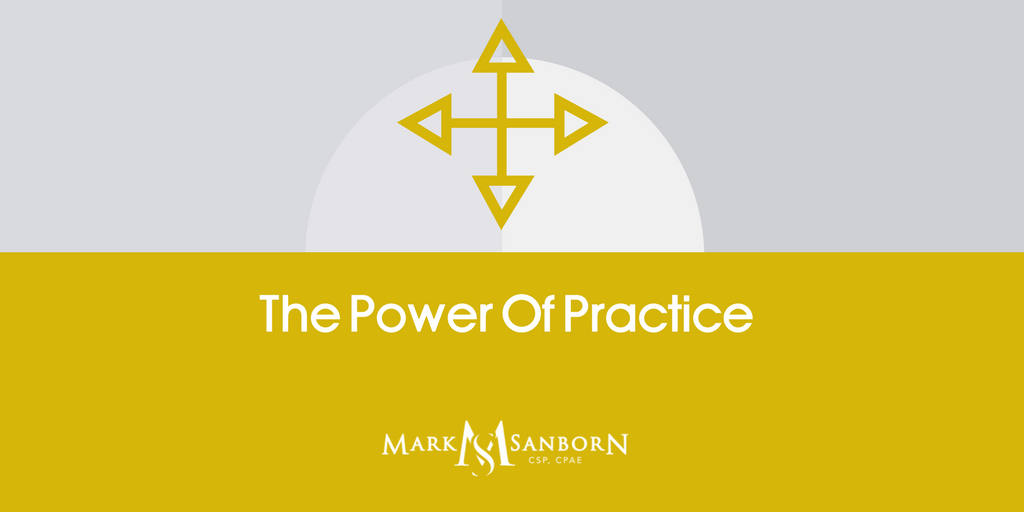“Practice won’t make you perfect, but it will make you better.” Mark Sanborn
Did your boss ask you to start this workday spending some time practicing your job? (I’m guessing “No.”)
Did you make time this morning to practice the skills upon which your livelihood (and your potential encores) depends? (Between getting the kids off to school, battling traffic, and the pile of papers on your desk—again I’m guessing “No.”)
Let’s face it: “Practice” conjures up images of artists, athletes, and actors—not people in the workaday world. So where does that leave the rest of us? Very few people in the world of work practice. The closest they come is a kind of “practice in process”—hoping that the more they do their job, the better they’ll get. And, if they’re lucky, practice in process does help more than it hurts.
But if we’re going to become remarkable performers we’re going to have to learn a different way to practice. Instead of just practicing in process, we need to learn to practice “prior to performing.”
Ask any artist, athlete, or actor: Practice is the key to remarkable performance. Without it, your performing days—not to mention your encores—may be numbered.
Deliberate Practice
If you think that term suggests that we’re talking about something beyond normal practice, you’re right. Researcher and senior editor at Fortune magazine, Geoffrey Colvin, differentiates between practice and deliberate practice this way: “Simply hitting a bucket of balls is not deliberate practice, which is why most golfers don’t get better. Hitting an eight-iron 300 times with a goal of leaving the ball within 20 feet of the pin 80 percent of the time, continually observing results and making appropriate adjustments, and doing that for hours every day—that’s deliberate practice.”
Given that example, it’s not hard to figure out why the crowd is small at the top of any given mountain. The following study, cited by Colvin in a Fortune article, serves to confirm that the more one practices, the better one gets: A study of 20-year-old violinists divided them into three groups: good, better, and best (as judged by music conservatory teachers). Those judged “best” had averaged 10,000 hours of deliberate practice since taking up the violin. Those judged “better” averaged 7,500 hours. And those judged “good” averaged 5,000 hours.
Because there are no perfect violinists—or salesmen, executives, teachers, or parents for that matter—we again find evidence for our thesis that practice doesn’t make one perfect, but deliberate practice does make one better.
Is the inability to obtain perfection good news or bad news? That depends on your perspective. Let me suggest a realistic but positive perspective: no matter how good you become, you can always get better. That keeps work and life interesting and challenging. If your current condition of performance was as good as it would ever get, the balance of your days would be pretty monotonous.
Learn to Practice and Practice to Learn
Deliberate practice means incorporating new insights and understanding daily as you practice. In other words, deliberate practice requires learning and building on the fruits of that learning.
Here are four learning tactics to fuel your practice. They are free, time-tested, and can be applied by anyone who is striving to become a remarkable performer:
1. Read. Surveys periodically tell us how many Americans are/are not reading books, and the trends are not always encouraging, especially among young people. But since the advent of the Internet, book-reading statistics don’t tell the whole story since so many people read online these days. Given the unlimited amounts of information available online today there is little justification for anyone not being a reader. Nor is there any reason for anyone to be without the information that would fuel his or her ascendancy to remarkable-performer status.
What performance do you want to improve? Begin by searching books, magazines, the internet or anywhere you can find ideas that will help make your performance remarkable.
2. Observe. There is a big difference between looking and observing. Every waking moment we see people, places, things, and actions. But how many of them do we observe for the purpose of learning from them?
My friend Jim Cathcart says, “To know more, notice more.”
3. Learn from the best. One of the early legends of speaking, Cavett Robert, used to say in jest, “People say I plagiarize, but if I do, I steal from the very best.”
Who are your mentors—either personal or long-distance? How many videos or DVD’s do you study in order to learn from those you admire? What kind of notebook or journal do you keep in which you write down serendipitous lessons learned throughout the day? Learning comes from careful observation, not casual looking.
4. Play. If you think of practicing your craft as “play” rather than “work,” you’ll find the process much more enjoyable. Play is the application of the principles you’ve learned. And play casts failure in a whole new light.
I seldom encounter business professionals who make time to practice their craft. While many learn from “practice in play” (gaining insights from doing one’s work rather than practicing in advance of performance), the remarkable performers are always those who know the importance of practice and make it a priority.









We have a saying, “Practice Makes Permanent” so be careful what you practice.
Thanks,